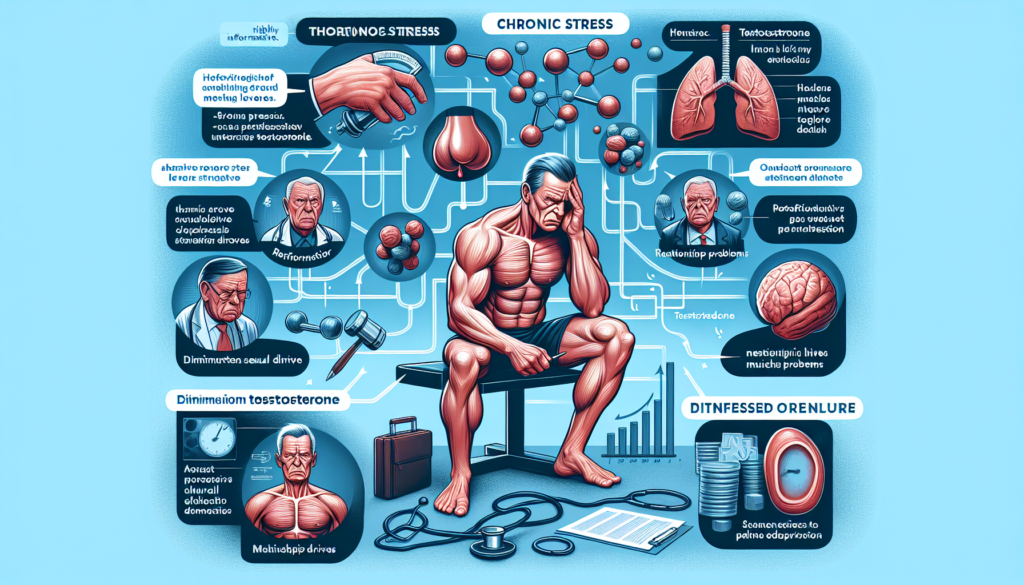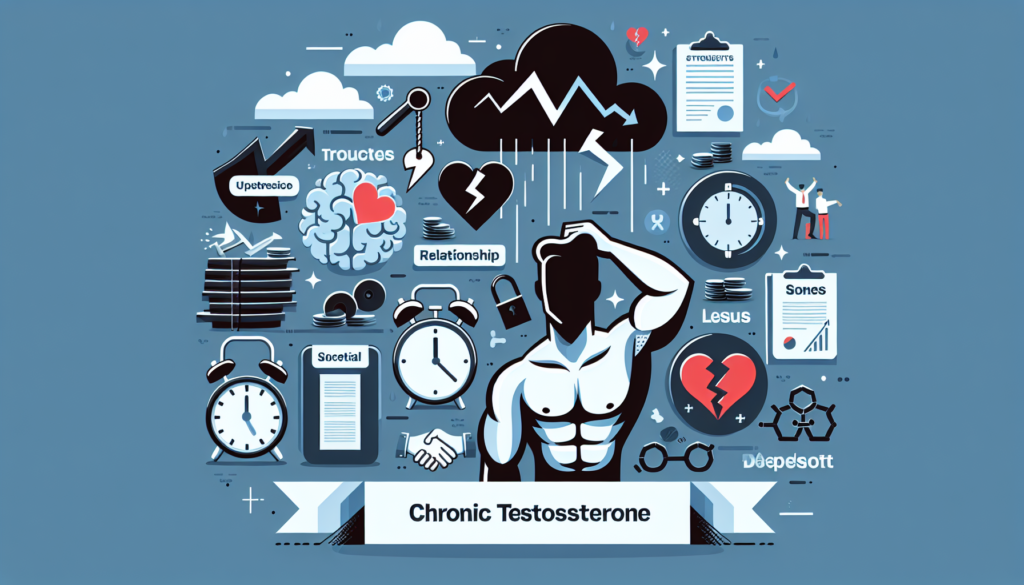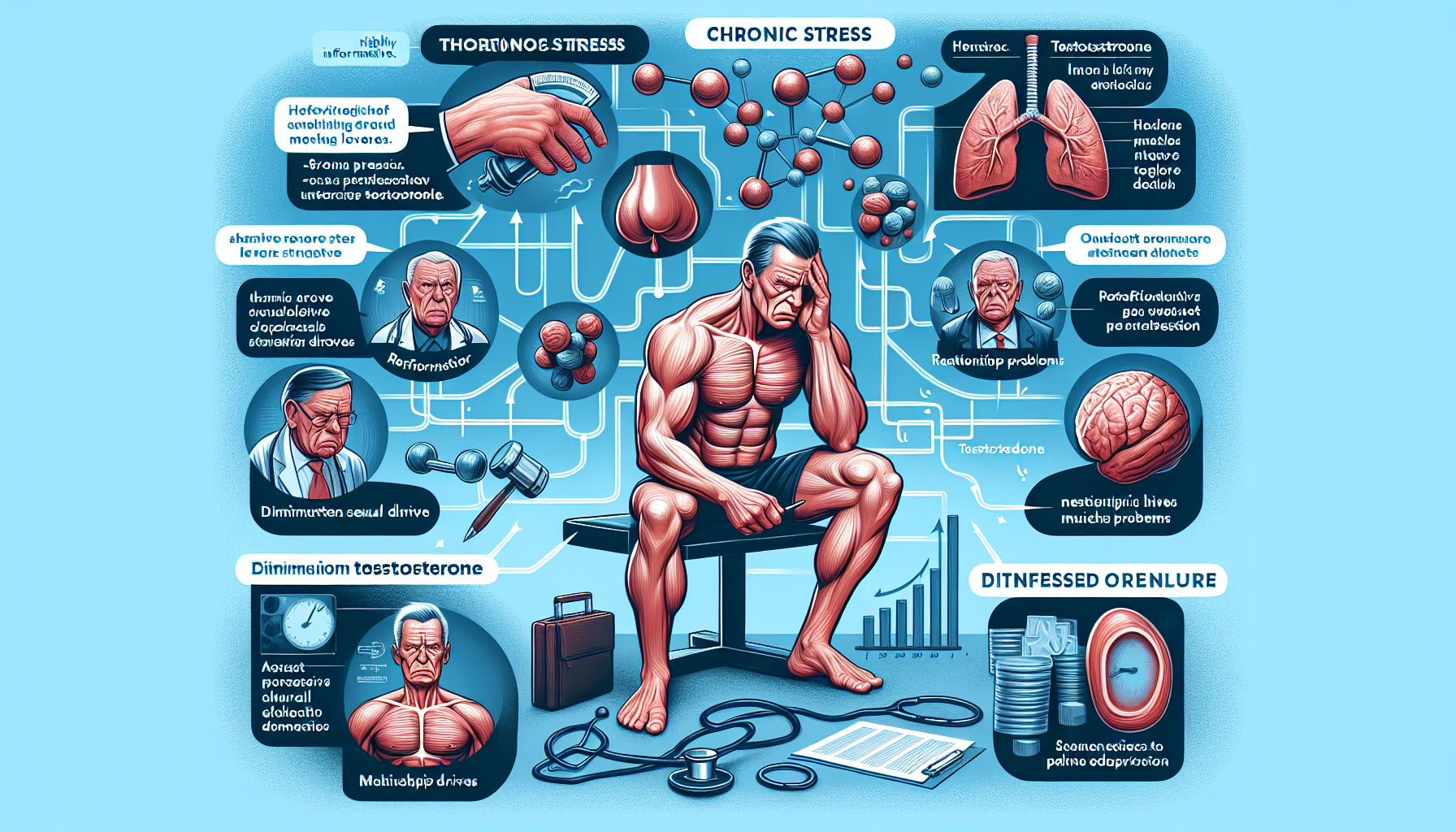Chronic stress can have a significant impact on men’s testosterone levels, leading to various health issues. In a video by Body Hub, tips on managing and reducing stress will be shared, along with the top three side effects of stress that contribute to the destruction of testosterone. Poor sleep and high blood sugar, both linked to stress, can disrupt hormone production and increase the risk of health problems. It is crucial for men to understand how chronic stress affects their testosterone levels and take steps to combat stress through regular exercise, a healthy diet, adequate sleep, and relaxation techniques.
One of the leading factors causing low testosterone in 98% of men is chronic stress. In a video by Body Hub, you will discover how stress can have detrimental effects on testosterone levels and learn effective ways to manage stress and increase testosterone naturally. Poor sleep, weight gain, and elevated blood sugar levels due to stress can all contribute to the destruction of testosterone. By incorporating lifestyle changes such as exercise, a healthy diet, and relaxation techniques like meditation and yoga, you can not only improve your overall well-being but also boost your testosterone levels.
Stress as a Universal Reaction
Stress is a natural reaction to countless life experiences. It is something that practically everyone experiences, but it should not be ignored, especially for males whose health and wellness rely heavily on the hormone testosterone. Many men suffer from low testosterone levels, and stress is one of the top factors that contribute to this condition. It is important to understand and address stress in order to maintain optimal health and well-being.
Understanding Stress
Stress is a common experience for everyone, and it can be triggered by various factors such as work, relationships, and financial pressures. The body’s response to stress is primarily driven by the release of stress hormones, particularly cortisol. When stress is acute, or short-term, it can actually have positive effects on the body, such as increasing alertness and focus. However, when stress becomes chronic, it can have detrimental effects on both physical and mental health.

Importance of Addressing Stress
Addressing and managing stress is crucial, especially for men concerned about their testosterone levels. Chronic stress can significantly lower testosterone levels, which can lead to a range of health issues, including decreased energy, reduced muscle mass, and diminished libido. By prioritizing stress management, individuals can enhance their overall well-being and maintain healthy testosterone levels.
The Impact of Stress on Testosterone Levels
Stress is a top contributor to low testosterone levels in men. Chronic stress can disrupt hormone production and lead to hormonal imbalances, including a decrease in testosterone. There are several key ways in which stress impacts testosterone levels and contributes to its destruction.
Examining the Link between Stress and Hormone Imbalances
Prolonged stress can alter the sleep-wake cycle and directly influence the body’s internal clock, leading to hormonal imbalances. In males, sleep issues due to stress can lower testosterone synthesis, impacting both physical and mental health. Research has shown that men who only get 5 hours of sleep for one week experience a significant drop in testosterone levels. Lack of sleep or poor sleep quality can also contribute to other health issues, such as anxiety, depression, and low metabolism.
Weight Gain and Fat Accumulation
Chronic stress can lead to weight gain and fat accumulation in the body. The stress hormone cortisol stimulates fat and carbohydrate metabolism, causing an energy surge. This increase in appetite, combined with cravings for sweet, fatty, and salty foods, can result in fat accumulation. This not only affects physical appearance but can also lead to digestive issues, fatigue, and further hormonal imbalances.
Elevated Blood Sugar Levels and Testosterone Production
Stress elevates the levels of cortisol and adrenaline in the blood, which leads to an increase in blood sugar levels. While this is a natural reaction and usually leads to a faster heartbeat and higher blood pressure, prolonged high stress levels can cause complications. High sugar levels can increase insulin resistance and ultimately lead to conditions like type 2 diabetes. Elevated blood sugar levels can affect testosterone production and increase the risk of headaches, weight gain, and heart-related diseases.
The Hypothalamic-Pituitary-Gonadal Axis and Testosterone
The hypothalamic-pituitary-gonadal (HPG) axis regulates sex hormones, including testosterone. Chronic stress can disrupt this axis, inhibiting the release of testosterone. Additionally, cortisol is thought to directly reduce testosterone production by acting on the Leydig cells in the testes. Chronic stress is also more likely to lead to unhealthy habits, such as comfort eating, alcohol consumption, smoking, or reduced exercise, which further contribute to lower testosterone levels.
Chronic vs. Acute Stress
While acute stress may temporarily increase testosterone levels, chronic stress is more likely to have negative effects. Acute stressors, such as exam stress, can temporarily boost testosterone levels. This is because acute stress causes an increase in luteinizing hormone (LH), which triggers testosterone production. However, chronic stress leads to a surplus of cortisol production, which suppresses testosterone production and can result in long-term health problems.
Negative Effects of Chronic Stress on Testosterone
Chronic stress can have a significant impact on testosterone levels in men. It not only disrupts hormone production but also leads to unhealthy habits and contributes to weight gain and fat accumulation. Additionally, chronic stress is associated with various health issues such as obesity, diabetes, and mental health problems, which are all linked to lower testosterone levels.

Managing and Reducing Stress
Managing and reducing stress is essential for maintaining healthy testosterone levels and overall well-being. There are several effective techniques that individuals can incorporate into their daily lives to combat stress and improve their testosterone levels naturally.
Regular Exercise as a Stress Management Technique
engaging in regular exercise is one of the most effective ways to alleviate stress. Physical activity can improve sleep quality and overall mood. Maintaining an active lifestyle has also been proven to boost testosterone synthesis, increase energy levels, and improve mental health. Exercise can include activities such as running, weightlifting, yoga, or any form of physical activity that suits individual preferences.
Following a Healthy Diet to Combat Stress
Adopting a well-balanced diet can significantly reduce the effects of stress on the body. A healthy diet not only benefits physical health but also improves mental well-being. Incorporating lean proteins, complex carbohydrates, and fatty acids into meals can provide essential nutrients and promote hormonal balance. Antioxidant-rich foods, such as berries, fruits, vegetables, and spices, can also help safeguard cells against damage caused by chronic stress.
The Importance of Quality Sleep
Prioritizing quality sleep is crucial for managing stress and maintaining healthy testosterone levels. Lack of sleep or poor sleep quality increases cortisol release, leading to heightened stress levels. Establishing a consistent sleep routine and aiming for 7 to 9 hours of sleep each night can reduce cortisol levels and support optimal hormone production. Creating a relaxing sleep environment and practicing good sleep hygiene habits, such as avoiding screens before bed and maintaining a cool and dark bedroom, can also promote better sleep quality.
Relaxation Techniques: Meditation and Yoga
Practicing relaxation techniques, such as meditation and yoga, can significantly reduce stress levels and improve overall well-being. Meditation has been around for centuries and is known to have numerous benefits, including stress reduction. It allows individuals to calm their minds, increase focus, and promote inner peace. Yoga combines physical movement with mindfulness, offering a holistic approach to stress management. Both meditation and yoga can be easily incorporated into daily routines and can have a profound impact on reducing stress and improving testosterone levels.
The Power of Connection and Laughter Therapy
Connecting with others and engaging in laughter therapy can be powerful tools for managing stress. Building and maintaining supportive relationships can provide a sense of belonging, reduce feelings of stress, and enhance overall well-being. Laughter therapy, whether through watching comedies, engaging in laughter exercises, or practicing laughter yoga, has been shown to lower stress hormones and promote relaxation.
Effective Stress Management for Improving Testosterone Levels
By incorporating regular exercise, following a healthy diet, prioritizing quality sleep, practicing relaxation techniques, and fostering connections with others, individuals can effectively manage stress and improve testosterone levels naturally. It is important to prioritize stress management as part of an overall approach to achieving optimal health and well-being.
Conclusion
Understanding the impact of stress on testosterone levels is essential for prioritizing stress management in order to maintain optimal health. Chronic stress can significantly lower testosterone levels in men, leading to various health issues. By managing and reducing stress through regular exercise, a healthy diet, quality sleep, relaxation techniques, and social connections, individuals can enhance their overall well-being and maintain healthy testosterone levels naturally. By taking proactive steps to address stress, individuals can protect their testosterone levels and achieve optimal health.

